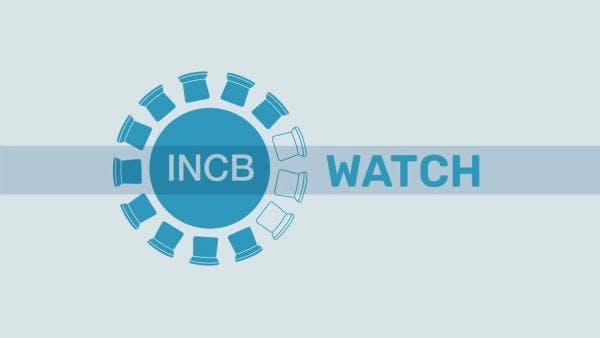The INCB at the 56th Session of the Commission on Narcotic Drugs
At the fifty-sixth session of the United Nations Commission on Narcotic Drugs, held last week in Vienna, the new President of the INCB, Mr. Raymond Yans, engaged in an informal dialogue with several non-government organisations, including the International Network of People who Use Drugs, Harm Reduction Coalition and World Forum Against Drugs. In terms of tone and content, it did not vary widely from the informal dialogue last year with the late former President, Mr Hamid Ghodse (for further details, see page 21 of the 2012 Commission on Narcotic Drugs: Report of proceedings – IDPC report ). Mr. Yans persisted with the position that the INCB cannot change its interpretation of the drug control conventions because only member states can amend the conventions. He reiterated INCB’s position that it has no authority to comment on human rights issues, and condemned the Netherland’s coffee shop policy and Vancouver’s supervised injection site for facilitating the distribution of controlled substances. However Mr. Yans said that during its country mission visits, the INCB encouraged countries to implement opioid substitution therapy and needle/syringe programmes, and did clarify to countries that the conventions do not require the imposition of criminal penalties for drug use. Such statements seem contrary to statements commonly made by the INCB, namely in its annual reports. There is subsequently a need for the INCB to express far greater support for expanding the provision of HIV prevention measures and removing criminal penalties for people who inject drugs. For further details of the informal dialogue, refer to the post on the CND blog.
The INCB released a statement on the outcome of the November 2012 vote in Colorado and Washington in favour of permitting the recreational use of cannabis. INCB President Mr. Raymond Yans noted a statement by the Office of the Attorney General of the United States in December 2012 that, regardless of any changes in state law, growing, selling or possessing any amount of marijuana would remain illegal under federal law. Mr. Yans said that this was “good, but insufficient”, and said that the United States has a treaty obligation to ensure the implementation of the treaties on the entirety of its territory.
The INCB soon released another statement on growing debates amongst state jurisdictions in the United States on allowing the use of cannabis for medical purposes. The INCB President commented that while permitted under international law if special conditions are met, “if these medical cannabis schemes are not regulated in line with the international drug control conventions, they can contribute to increasing levels of cannabis abuse, such as in some states of the United States” and could be seen as “back-door legalization” of cannabis for recreational use.
Finally during the plenary session, Thailand, Japan and China questioned the World Health Organisation’s recommendation against the scheduling of ketamine, referring to the increasing ‘abuse’ of ketamine in their region. They asked the WHO to review its decision. Refer to a recent IDPC blog post for further information on the limitations of the INCB's role in scheduling decisions, and the implications of scheduling ketamine.
Regions
Related Profiles
- International Narcotics Control Board (INCB)
